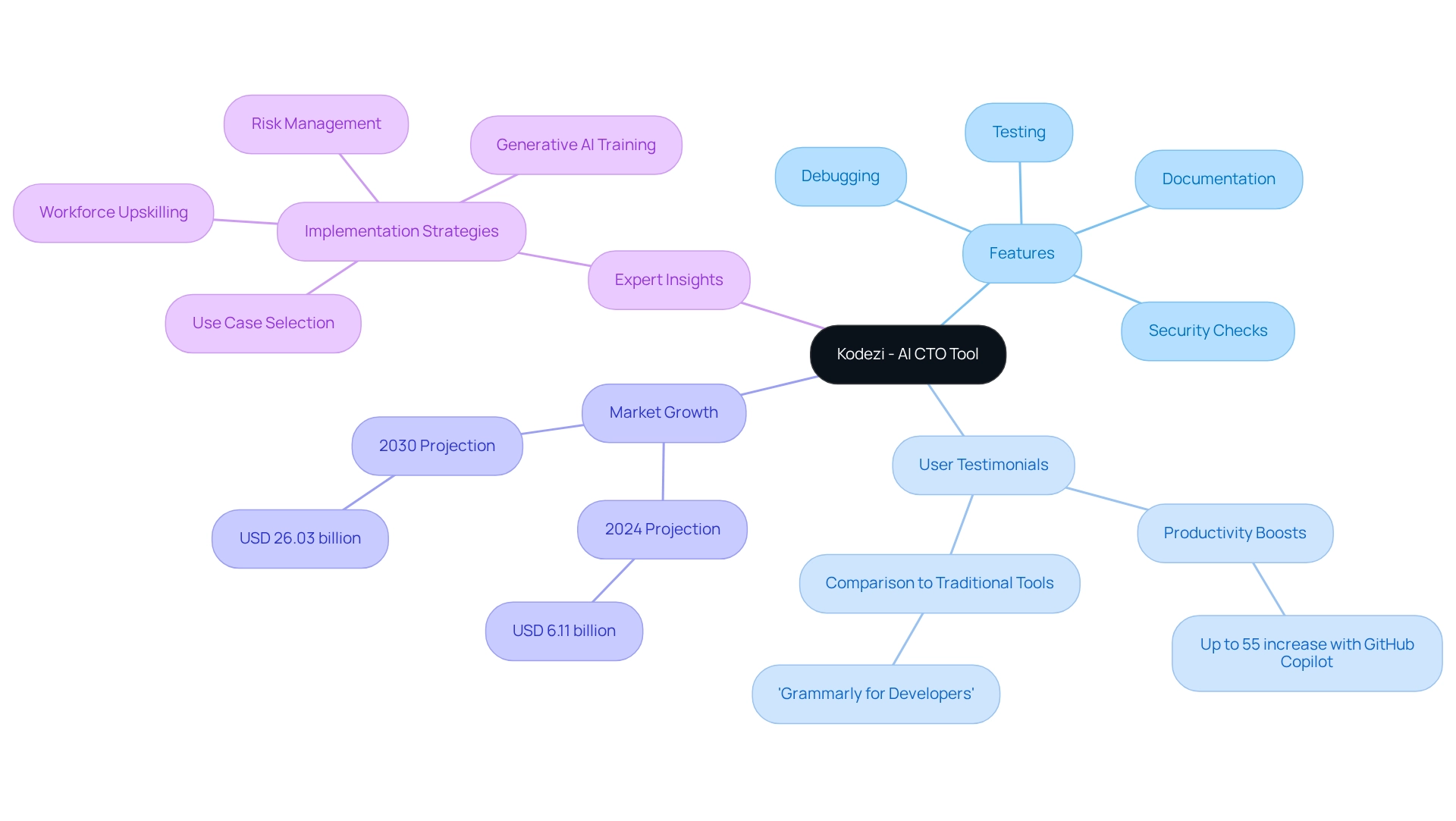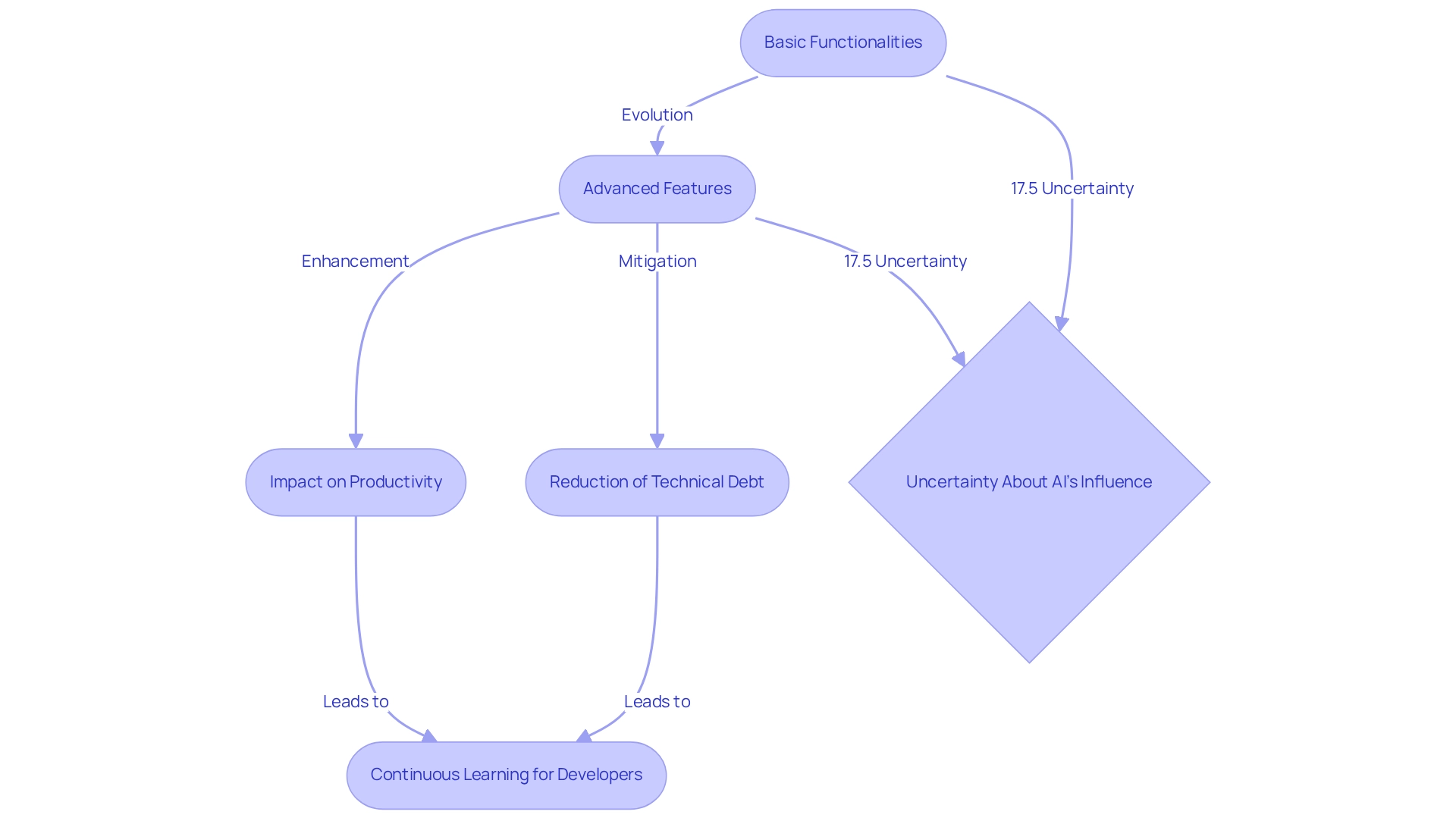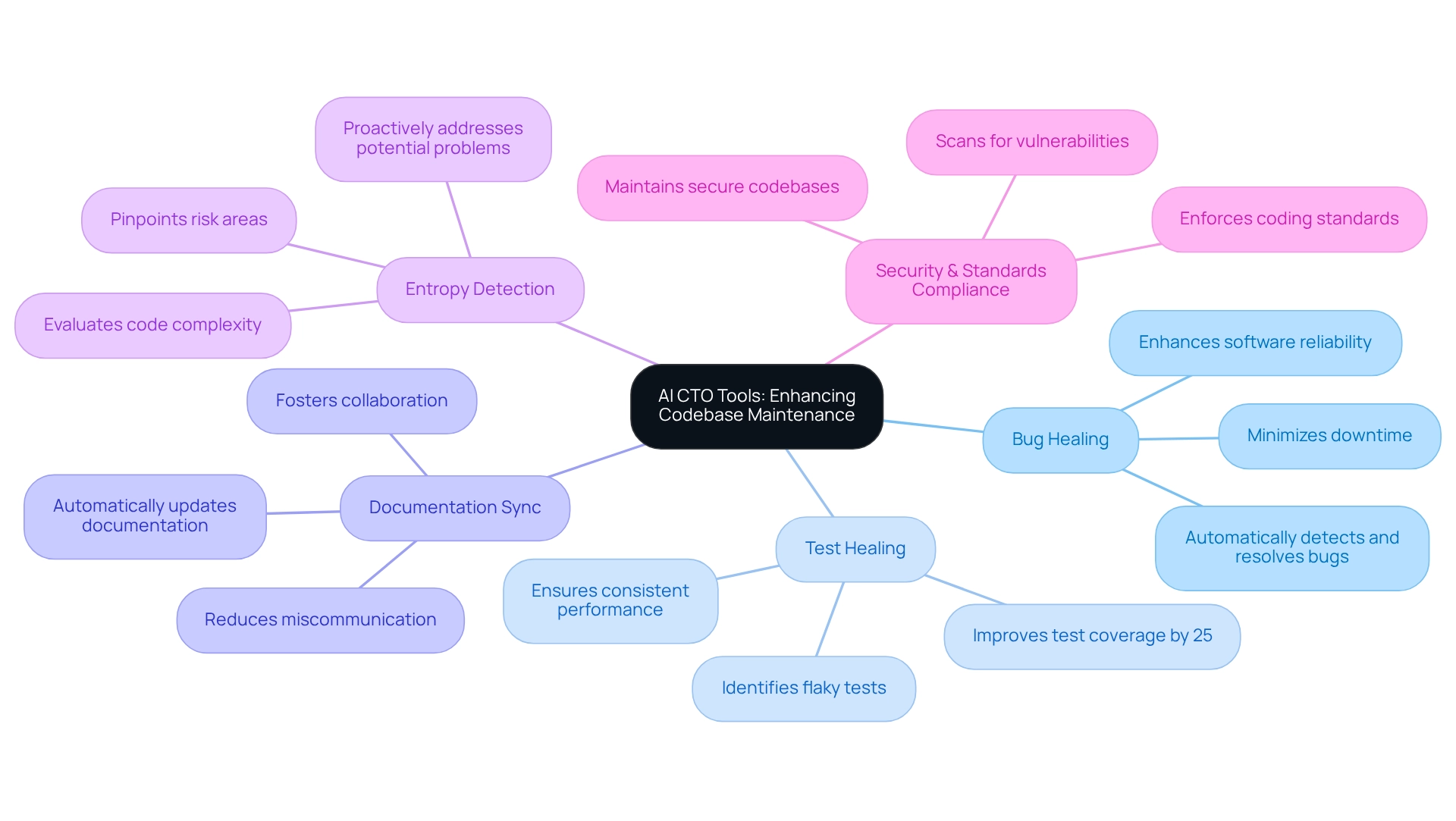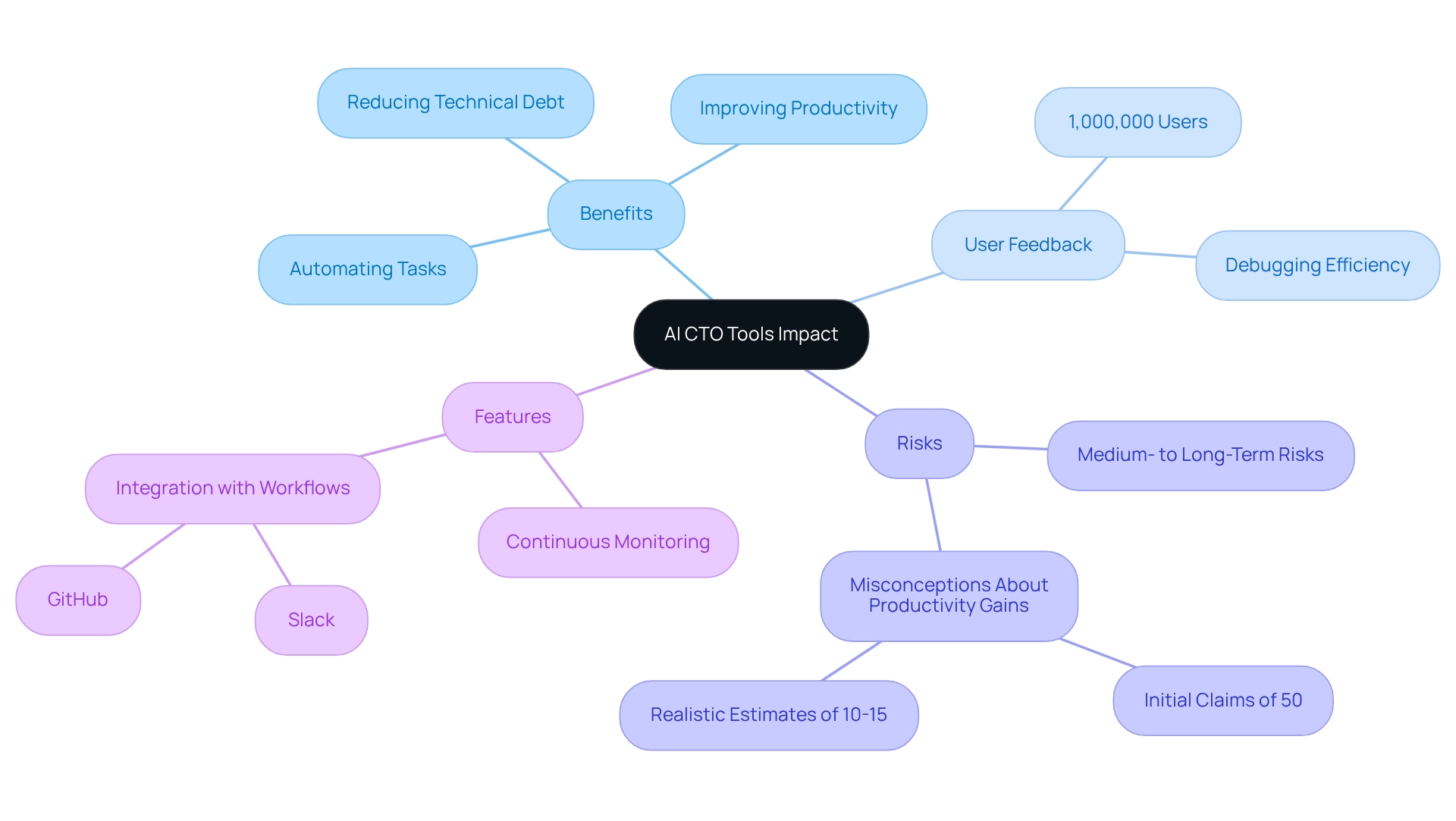Overview
In the ever-evolving landscape of software development, developers often face significant challenges, particularly in maintaining code quality and managing technical debt. Enter Kodezi, an innovative AI CTO tool designed to tackle these pain points head-on. By automating essential tasks such as bug fixing, documentation updates, and security checks, Kodezi not only streamlines the development process but also empowers developers to focus on more complex tasks.
Imagine being able to enhance your productivity while significantly reducing the time spent on routine maintenance. Kodezi’s features allow for a more efficient coding experience, improving overall coding efficiency and enabling teams to deliver higher quality software. Furthermore, by alleviating the burden of mundane tasks, developers can dedicate their skills to solving intricate problems, ultimately leading to a more robust codebase.
Are you ready to transform your coding practices? Explore the tools available on Kodezi’s platform and discover how this AI-driven solution can revolutionize your approach to software development. With Kodezi, not only can you optimize your workflow, but you can also ensure your team is equipped to tackle the challenges of modern coding with confidence.
Introduction
In the fast-evolving landscape of software development, developers face numerous challenges, particularly as the role of Chief Technology Officers (CTOs) grows increasingly complex. How can organizations effectively streamline processes and enhance productivity? Enter AI CTO tools—cutting-edge software like Kodezi CLI, specifically designed to address these coding challenges. Kodezi not only automates routine tasks such as debugging and documentation but also proactively monitors code health, ensuring that software remains robust and efficient.
Furthermore, as organizations grapple with the burdens of technical debt and the need for rapid development cycles, the transformative potential of AI in coding practices becomes impossible to ignore. By leveraging Kodezi, teams can significantly improve their workflow, reduce errors, and enhance code quality. With a burgeoning market projected to reach billions in the coming years, understanding the features and benefits of these tools is essential for any engineering team looking to elevate their productivity and maintain a competitive edge.
In addition, consider the efficiency gains that come with adopting Kodezi. Imagine a scenario where your team spends less time on mundane tasks and more on innovation. By exploring the tools available on the platform, you can empower your engineering team to thrive in this competitive landscape.
Defining AI CTO Tools: An Overview
In the fast-paced world of software development, coding challenges are a common hurdle that developers face daily. Enter Kodezi, an innovative AI CTO tool designed to assist Chief Technology Officers (CTOs) and engineering teams in managing and optimizing codebases efficiently. This innovative AI CTO tool harnesses the power of artificial intelligence to automate critical aspects of software development, such as debugging, testing, documentation, and security checks. Unlike traditional tools that primarily focus on generating new code, Kodezi emphasizes the continuous upkeep and enhancement of existing software, ensuring it remains organized, compliant, and production-ready over time.
Furthermore, Kodezi seamlessly integrates with development environments, acting as an independent collaborator that consistently monitors software health and proactively addresses issues as they arise. One standout feature is its command-line interface (CLI), which provides a flexible solution for teams to auto-heal codebases and enhance programming productivity. By autonomously improving code quality and resolving issues before they reach production, Kodezi becomes an invaluable asset for B2B engineering teams. Developers can significantly reduce the time spent on debugging, allowing them to focus on more advanced tasks and boost overall efficiency.
User testimonials highlight Kodezi's transformative impact on debugging and productivity, with over 1,000,000 users praising its ability to optimize coding workflows. Many users have reported that Kodezi has helped them identify and resolve issues more quickly and easily than traditional methods, effectively positioning it as a 'Grammarly for developers.' This feedback underscores Kodezi's role in enhancing programming skills and efficiency among developers.
The market for AI programming resources is poised for substantial growth, with projections indicating it will reach USD 6.11 billion in 2024 and soar to USD 26.03 billion by 2030. This trend reflects the increasing reliance on generative AI tools that automate tasks previously requiring significant human input, thereby improving overall efficiency.
Real-world examples further illustrate the effectiveness of AI CTO solutions in software development. For instance, a study revealed that developers utilizing GitHub Copilot experienced productivity boosts of up to 55%. Additionally, North America currently leads the AI software market, holding a 39.5% share in 2023, driven by robust infrastructure and considerable investments in AI research and development.
Expert insights stress the importance of a systematic approach to implementing these resources. Industry consultants emphasize that a comprehensive strategy—including generative AI training, use case selection, workforce upskilling, and risk management—can lay a solid foundation for organizations aiming to leverage AI in their development processes. Overall, the AI CTO tool Kodezi is not merely about creating new programming; it is essential for maintaining the integrity and efficiency of existing software bases, making it an indispensable asset for modern engineering teams.

The Evolution of AI CTO Tools in Software Development
The evolution of the AI CTO tool has emerged from the fundamental challenges developers face in coding productivity. As software development grows increasingly complex, the demand for tools that ensure quality and maintainability has intensified. Initially, these resources offered basic functionalities such as syntax correction and code completion. Now, with advancements in machine learning and natural language processing, modern tools can autonomously detect and rectify bugs, rewrite tests, and update documentation. This transformation marks a significant shift in software engineering, where AI CTO resources have progressed from merely providing support to overseeing the entire development process.
But how does this evolution impact productivity? Not only do these advancements enhance coding efficiency, but they also play a vital role in reducing technical debt. Interestingly, 17.5% of companies still express uncertainty regarding AI's influence on their processes. This highlights the necessity for ongoing discussions among developers and policymakers to navigate the ethical complexities associated with AI.
Moreover, case studies reveal that AI resources foster continuous learning for developers by offering real-time data and insights. This allows them to stay current with the latest technologies and refine their programming skills. As resources related to the AI CTO tool continue to advance, their impact on coding efficiency and overall software development practices becomes increasingly significant.
In addition, consider how Kodezi can specifically address these challenges. With its suite of features designed to streamline the development process, Kodezi not only boosts productivity but also enhances code quality. As you explore the tools available on the platform, reflect on how they can support your coding practices and contribute to your growth as a developer.

Key Features of AI CTO Tools: Enhancing Codebase Maintenance
In the ever-evolving landscape of software development, coding challenges can often hinder productivity and innovation. How can developers effectively maintain their codebases while focusing on delivering new features? Kodezi offers a suite of tools, with the ai cto tool being one of its key functionalities, designed to tackle these challenges head-on and streamline codebase maintenance.
- Bug Healing is one such feature that automatically detects and resolves bugs, significantly enhancing software reliability and minimizing downtime.
- Test Healing identifies flaky tests and rewrites them, ensuring consistent performance during continuous integration cycles. This is crucial for maintaining high test coverage across critical microservices and ultimately improving overall software quality.
- Furthermore, Kodezi ensures that documentation remains current with its Documentation Sync feature, which automatically updates README files, changelogs, and inline comments. This guarantees that all team members have access to the latest information, fostering collaboration and reducing miscommunication.
- Additionally, Entropy Detection evaluates code complexity and pinpoints risk areas, empowering teams to proactively address potential problems before they escalate.
- In addition, the platform emphasizes Security & Standards Compliance by scanning for vulnerabilities and enforcing coding standards. This assists teams in maintaining secure and compliant codebases, a necessity as security threats continue to evolve.
As Sasha B. aptly puts it, "Real results, real caution." By leveraging these features, engineering teams can enhance the maintainability of their codebases, allowing them to focus on innovation rather than routine maintenance tasks. The case study titled 'The Transformative Power of AI in Software Development' further illustrates the tangible impact of the ai cto tool on productivity and efficiency, showcasing specific results that advocate for its adoption. Why not explore the tools available on the Kodezi platform and experience the benefits firsthand?

Revolutionizing Codebase Maintenance: The Impact of AI CTO Tools
The challenges of maintaining a codebase can be daunting for developers. However, the arrival of the AI CTO tool has fundamentally transformed how engineering teams approach these tasks. By automating routine activities like bug fixing and documentation updates, applications such as Kodezi CLI liberate developers from the burden of manual debugging. This allows them to focus on higher-level design and feature development.
Kodezi CLI serves as a versatile solution for B2B engineering groups, autonomously enhancing code quality and resolving bugs before they reach production. Furthermore, the continuous monitoring capabilities of the AI CTO tool ensure that codebases remain healthy and scalable, significantly reducing the risk of accumulating technical debt. In addition, integrating these resources into existing workflows fosters collaboration among team members, as insights and solutions are shared effortlessly through platforms like Slack and GitHub. Organizations that utilize the AI CTO tool can anticipate not only improved software quality but also accelerated development cycles and increased overall productivity. User feedback highlights Kodezi's impact on debugging efficiency and productivity, with over 1,000,000 users praising its intuitive features. However, it is crucial to remain vigilant about the medium- to long-term risks associated with coding assistants. A case study on misconceptions regarding productivity gains from these tools reveals that while initial claims suggested a 50% improvement, more realistic estimates indicate gains of only 10-15%. Still, this represents a significant advantage, particularly when considering that today’s coding assistants cost less than 0.01% of a typical delivery team’s run rate.
By shifting the focus from merely writing code to maintaining and evolving it, Kodezi plays a vital role in enhancing developer productivity and mitigating technical debt in software projects. For those interested in exploring Kodezi CLI, a 5-minute quickstart and demo are available to help users get started quickly.

Conclusion
The emergence of AI CTO tools signifies a pivotal shift in software development, addressing the complexities faced by engineering teams and Chief Technology Officers. Tools like Kodezi CLI streamline codebase maintenance by automating essential tasks such as:
- Bug fixing
- Documentation updates
- Security compliance
This enhancement not only improves code quality but also allows developers to focus on higher-level design and innovation, ultimately driving productivity and reducing technical debt.
Furthermore, the evolution of these tools reflects a response to the increasing demands for efficiency and reliability in software development processes. As AI technology continues to advance, the capabilities of AI CTO tools have expanded from basic coding assistance to comprehensive solutions that manage the entire development lifecycle. The impressive user feedback and substantial market growth projections underscore the transformative impact these tools have on coding practices, making them indispensable for modern engineering teams.
In a landscape where rapid development cycles and robust code health are paramount, embracing AI CTO tools is essential for organizations aiming to maintain a competitive edge. By investing in tools like Kodezi, teams can not only improve their workflow but also foster a culture of continuous learning and adaptation. The future of software development is undoubtedly intertwined with the intelligent automation these tools provide, paving the way for more efficient, secure, and innovative coding practices.
Frequently Asked Questions
What is Kodezi?
Kodezi is an innovative AI CTO tool designed to assist Chief Technology Officers (CTOs) and engineering teams in managing and optimizing codebases efficiently. It automates critical aspects of software development, such as debugging, testing, documentation, and security checks.
How does Kodezi differ from traditional coding tools?
Unlike traditional tools that primarily focus on generating new code, Kodezi emphasizes the continuous upkeep and enhancement of existing software, ensuring it remains organized, compliant, and production-ready over time.
What is a unique feature of Kodezi?
Kodezi features a command-line interface (CLI) that provides a flexible solution for teams to auto-heal codebases and enhance programming productivity, autonomously improving code quality and resolving issues before they reach production.
How does Kodezi impact developer productivity?
Kodezi allows developers to significantly reduce the time spent on debugging, enabling them to focus on more advanced tasks and boost overall efficiency. User testimonials indicate it has transformed debugging and productivity for many, likening it to 'Grammarly for developers.'
What are the market projections for AI programming resources?
The market for AI programming resources is projected to reach USD 6.11 billion in 2024 and soar to USD 26.03 billion by 2030, reflecting the increasing reliance on generative AI tools that automate tasks previously requiring significant human input.
Are there any real-world examples demonstrating the effectiveness of AI CTO solutions?
Yes, a study revealed that developers using GitHub Copilot experienced productivity boosts of up to 55%. Additionally, North America leads the AI software market with a 39.5% share in 2023, driven by strong infrastructure and investments in AI research.
What do experts suggest for implementing AI tools like Kodezi?
Experts emphasize the importance of a systematic approach to implementing AI resources, including generative AI training, use case selection, workforce upskilling, and risk management to build a solid foundation for organizations leveraging AI in development processes.




